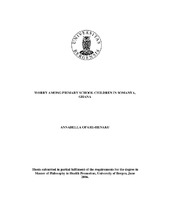| dc.description.abstract | This study assessed the content, frequency and distribution of worries among primary school children in Somanya, Ghana. In part one, 85 primary school children aged between 10-to-15 years listed their worries through a list generation technique and a focus group discussion. In part two, the worries generated by the children were categorized and a questionnaire was constructed for measuring frequency of typical worries. 120 primary school children of same age range ranked the frequency with which they worried. The list generation described the content of the children’s worries, and were grouped under six main categories respecting the child’s life namely, ‘Personal care’; ‘Education’; ‘Breaking norms’; ‘Family relationships’; ‘Safety and Environment’; and ‘Sickness and death’. The children’s responses to the frequency scale indicated that their topmost worries related to ‘Care’. The study documented gender and age difference in worries. The girls in this study listed more worries than the boys. Younger participants (10-12 year olds) listed more worries than older ones (13-15 year olds). However, statistical analysis did not reveal an overall gender and age differences in frequency of worrying. The children also indicated that they talked more to adults (parents, teachers and other adults in their families) about their worries. The thematic content of worries revealed systematic differences between orphaned and non-orphaned children. Orphaned children related more worries on the well-being of their current caregivers, sickness and death of parents. Their worries also demonstrated problems of adjusting into their new families. Implications of the findings are discussed in relation to the child’s sense of secure base. The role of parent/caregivers as moderators and mediators of important issues and life experiences have been emphasised. | en_US |
